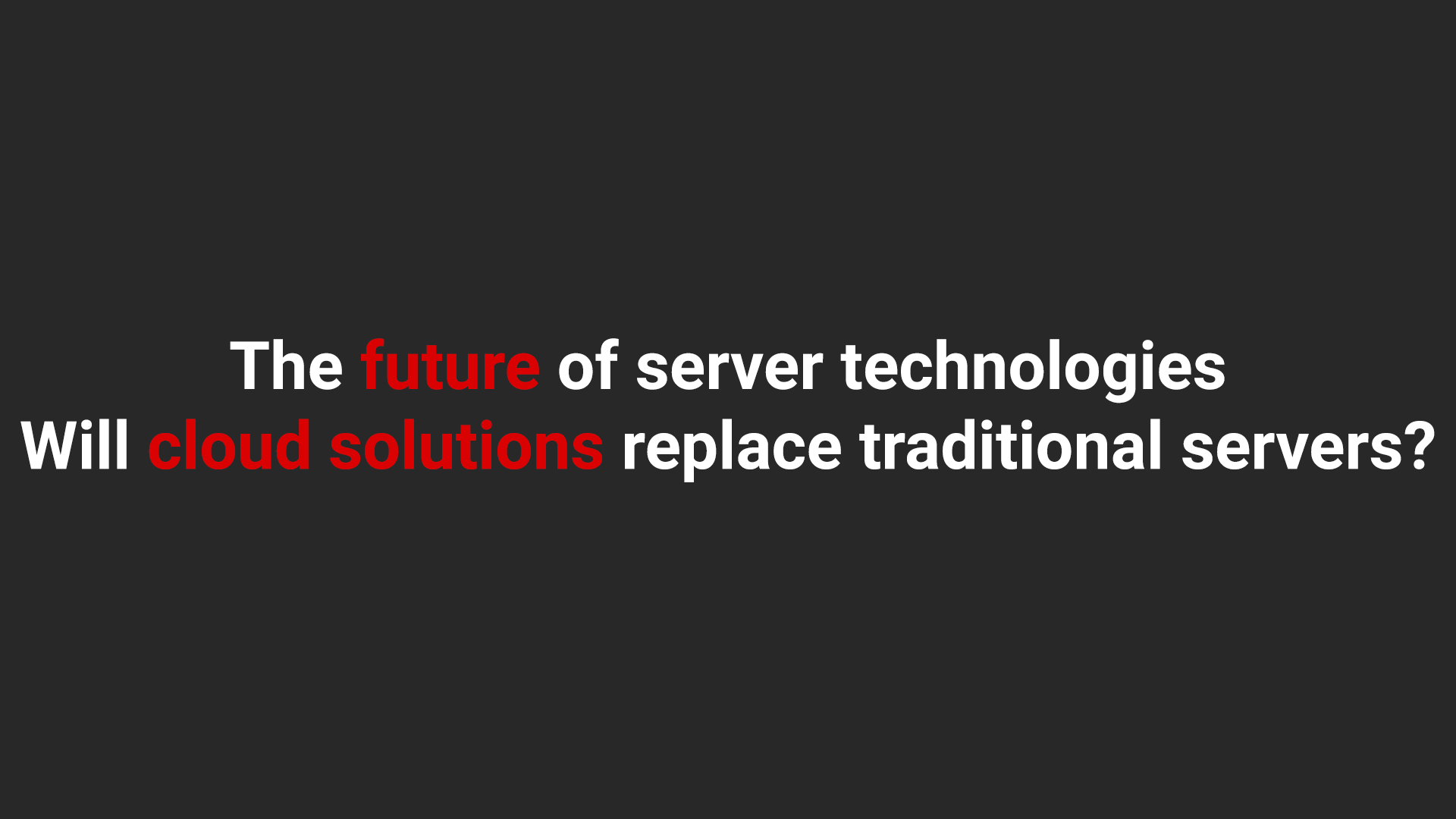The future of server technologies: Will cloud solutions replace traditional servers?

The IT world is developing rapidly, and one of the most discussed topics remains the transition from traditional physical servers to cloud solutions. Many companies have already opted for the cloud, while others still adhere to the classical approach.
But will cloud technologies really completely replace traditional servers, or does physical machines still have a future? Let's look at the advantages and disadvantages of each option and whether your business should consider switching to the cloud.
Traditional servers vs. The cloud – what's the difference?
Physical (traditional) servers
These are dedicated machines installed in data centers or within the company. They provide full control over resources and settings. This solution is very good due to full access to the server and its full control, but it also has disadvantages, for example, if something burns out, you will have to buy parts again, which will cause losses.
Advantages of traditional servers:
- Full control over hardware and data.
- High performance without the risk of "neighborhood" with other users.
- The ability to work without an Internet connection (local servers).
Minuses:
- High cost of purchase and maintenance.
- Qualified personnel are required for administration.
- Limited scaling options – when the load increases, you need to buy a new server.
- The need for a location with good ventilation to host the server.
Cloud servers
Cloud technologies offer a flexible model for using computing power as needed. You only pay for the actual resource consumption, without having to maintain the physical hardware. In today's world, cloud servers also include cloud dedicated servers, for example, by renting dedicated servers from us, you get full access and there is no need to buy parts or worry about failures because we are doing this.
Advantages of the cloud:
- Flexibility – you can increase or decrease resources in real time.
- Cost optimization – no need to invest in the purchase of equipment.
- High fault tolerance – data is stored in multiple data centers.
- Easy to manage – server deployment takes a few minutes.
Cons:
- Dependence on Internet connection.
- Possible risks of data leakage (if the cloud provider does not provide sufficient security).
- Possible limitations in hardware and software configuration.
Please note that we have no problems configuring hardware and software, but this applies specifically to our dedicated servers.
Will the cloud replace traditional servers?
At the moment, the answer is probably no, but it is already becoming the main choice for most companies. A complete abandonment of physical servers is impossible for a number of reasons:
- Sensitive data and confidentiality – some companies (for example, banks, government organizations) prefer to keep critical data on their local servers, and this is logical for large companies.
- High computing power – in some cases, buying your own server is more cost-effective than renting cloud resources. However, currently this applies only to large companies or government agencies, but even so, more and more companies are switching to cloud solutions.
- Specific hardware requirements – if a company uses custom server solutions, cloud services may not be suitable.
Nevertheless, the flexibility, speed, and cost-effectiveness of cloud solutions are making them increasingly attractive, and this is a true reason to listen. Many new startups and small companies prefer to start with cloud servers, while large corporations are actively implementing hybrid infrastructures by combining cloud and physical servers.
How to choose the best solution for your business?
The choice between traditional servers and the cloud depends on the company's objectives.
When is it better to choose physical servers?:
- If you need full control over the hardware and software. (Again, it is worth considering that there are hosting companies that can provide you with dedicated servers, for example, our dedicated servers)
- If the work requires low delays (for example, financial trading systems).
- If data security is a priority, and cloud storage cannot be trusted.
When is it better to choose cloud servers:
- If you need fast startup and scalability. This applies in particular to VPS or VDS, and this is a really big plus for those who want to quickly launch their website or application.
- If the budget is limited, and it is important to reduce the cost of IT infrastructure. In this case, renting a VPS will be your choice because the technical part of the server is serviced by a hosting company, and all you have to do is work.
- If it is necessary to ensure high fault tolerance.
How will MivoCloud help you choose the perfect solution?
At MivoCloud, we offer both cloud solutions and dedicated servers, allowing you to choose the best option for your business.
Our advantages:
- Dedicated servers for high performance and security.
- Flexible cloud VPS with instant scaling.
- DDoS protection to protect your data.
- Data centers in Romania, Moldova, the USA and Russia – choose the optimal location.
- 24/7 support – prompt assistance in any matters.
- The ability to pay in cryptocurrency is a convenience for international clients.
Not sure which solution to choose? Visit MivoCloud.com and get advice on choosing servers!

